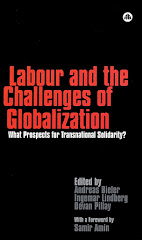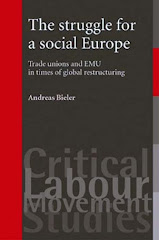With the global economic crisis being
anything but over, there are continuing struggles over how to respond to
economic stagnation. While the right continues to push for austerity and
neo-liberal restructuring and a new extreme right combines this with blaming
migrants for economic woes, the left envisages a new role for the state in
reviving economic fortunes. As different as these positions are, what they have
all in common, though, is this view of nature as an external resource. In his
fascinating book Capitalism in the Web of Life: Ecology and the
Accumulation of Capital (Verso, 2015), Jason Moore critically engages with
this understanding and contrasts it with a dialectical position emphasising the
internal relations between humans and nature. In this blog post, I will provide
an overview of some of the key aspects of Moore’s argument.
The
internal relations between capitalism and nature
Capitalism presents nature as an
external resource. ‘Capitalism’s governing conceit is that it may do with
Nature as it pleases, that Nature is external and may be coded, quantified, and
rationalized to serve economic growth, social development, or some other higher
good’ (P.2). Focusing on the internal relations, Moore argues that the
dialectical relationship between humans and nature can be grasped within the
concept of ‘oikeios’. ‘From the perspective of the oikeios, civilizations … do
not “interact” with nature as resource (or as garbage can); they develop
through nature-as-matrix’ (P.36).
Drawing on Marx, Moore’s key point of
departure is, therefore, a focus on the internal relations between capitalism
and nature, called the ‘double internality’. ‘The dialectical thrust of Marx’s
philosophy is to see humanity/nature as a flow of flows: as human internalising
the whole of nature, and the whole of nature internalizing humanity’s mosaic of
difference and coherence’ (P.22). Focusing on the inner connections allows
Moore to understand human history as co-produced history and the history of
capitalism as one of successive historical natures.
Similar to other Marxist approaches,
Moore emphasises capitalism’s inner dynamic of constant outward expansion.
However, this is not only related to intensified exploitation of wage labour in
processes of commodification. Capitalism equally depends on the appropriation
of unpaid human and extra-human work, what Moore refers to as the Four Cheaps.
‘Capital must not only ceaselessly accumulate and revolutionize commodity
production; it must ceaselessly search for, and find ways to produce, Cheap
Natures: a rising stream of low-cost food, labor-power, energy, and raw
materials to the factory gates (or office doors, or …)’ (P.53). Moore
identifies two key ways of how appropriation of free nature occurs. ‘The first
pivots on processes of biophysical reproduction (labour-power, forestry,
agriculture); the second, on geological extractions (energy, minerals). In
ecological revolutions, both appropriations raise labor productivity above the
prevailing system-wide average without a corresponding increase in constant
capital (machinery and inputs)’ (P.146).
Thus, analysing the capitalist social
relations of production, Moore offers us the possibility to comprehend and
conceptualise capitalist exploitation as not only taking place in the work
place. Capitalist accumulation equally depends on exploitation in the sphere of
social reproduction. ‘The relations of reproduction cut across the paid/unpaid
work and human/extra-human boundaries. In this, the historical condition for
socially necessary labor-time is socially necessary unpaid work’ (P.65).
The
tendency of the ecological surplus to fall
Incorporating a dialectical understand
of nature into our assessment of capitalism then allows us, Moore argues, to
understand the tendency of the ecological surplus to fall. While surplus
capital tends to rise, ecological surplus falls. As capitalist accumulation
increases faster than the appropriation of unpaid human and extra-human work,
there is this constant pressure to extend the capitalist frontier into new
forms of cheap energy, cheap raw materials and cheap food, closely related to
cheap labour. ‘As English agriculture stagnated after 1760, grain was imported
in growing volumes, at first from Ireland and, after the 1846 repeal of the
Corn Laws, increasingly from North America. Britain’s
mid-nineteenth-century-zenith as the “workshop of the world” was closely linked
to the agricultural revolution of the American Midwest’ (P.136).
Capitalist crises are overcome through a
combination of expanding capitalist commodity production in tandem with
establishing new ways of appropriating free nature. ‘Capital therefore depends
on the Four Cheaps, and there is only one way to get this Cheap nature fix: the
frontier. The response to this imperative has been endless geographical
expansion and endless innovation’ (P.155);
‘Cultural fixes’ play a crucial role in
overcoming crises. They ‘transcend the wage-relation’s double boundary with
unpaid work. Such fixes naturalize not only capital’s appropriation of unpaid
work by humans – above all the reproduction of labor-power – but also new
epoch-making practices of appropriating unpaid work by extra-human natures’
(P.198). And it is scientific advances in understanding nature and measure it,
which ultimately pave the way to new forms regarding nature as external and
thus available for appropriation. For example, ‘mapping space was constitutive
of global conquest’ (P.212).
Neoliberal
capitalism and the end of Cheap Nature as a civilizational strategy?
Analysing the rise of neoliberalism in
the 1970s and 1980s, Moore identifies the crucial role of Cheap Nature in this
process. ‘The neoliberal “boom” that commenced after 1983 was accompanied – or
preceded – by a significant cyclical decline in food, energy, and resource
prices. Commodity prices for food declined 39 percent – and metals by half –
between 1975 and 1989. Meanwhile, oil stabilized by 1983, for the next twenty
years, at a price per barrel about twice that of the postwar era’ (P.236). The
flow of cheap food from the Global North into the Global South during the
1980s, made possible by imposed structural adjustment programmes, displaced
millions of peasants and, thereby, created the cheap labour, transnational
corporations have drawn on ever since (P.263).
Instead of locating the start of the
current global economic crisis in 2007/2008, Moore refers to 2003, when the
commodity boom implied an increase in price of the Four Cheaps and thus, in
line with the tendency of the ecological surplus to fall, unpaid work could no
longer be appropriated faster than the increasing mass of accumulated surplus
(P.226). Financialisation has allowed capital to survive longer in the form of
a new world-ecological revolution. ‘The “conversion of the global South into a
“world farm”, the industrialization of the South, and the radical
externalization of biophysical costs, giving rise to everything from cancer
epidemics to Global Warming – all figure prominently in the unusually expansive
character of finance-led appropriations of the oikeios during the neoliberal
era’ (PP.161-2).
Moore ends on an ominous note.
Financialisation has allowed capitalism to survive. ‘But for how much longer?’
The
appropriation of unpaid work and the centrality of wage labour
This is an impressive book, opening up
novel conceptual ways of how to integrate the exploitation of nature into a
class analysis of capitalism’s relentless outward expansion through a focus on
the philosophy of internal relations. My only critical comment is in relation
to Moore’s reliance on a world systems theory definition of capitalism and
related references to the long 16th century, when capitalism is
alleged to have emerged in tandem with the establishment of a world market
(P.12). ‘The rise of capitalism after 1450s was made possible by an epochal
shift in the scale, speed, and scope of landscape transformation in the Atlantic
world and beyond. The long seventeenth century’s forest clearances of the
Vistula Basin and Brazil’s Atlantic Rainforest occurred on a scale, and at a
speed, between five and ten times greater than everything seen in medieval
Europe’ (P.182).
Moore is right to locate the shift in
scale and speed of transformation within capitalism. Nevertheless, a focus on the
world market as key to capitalism cannot explain the compulsion to constant
expansion. It is here where a focus on the social relations of production
becomes essential. And while capitalism does depend on unpaid human and
extra-human work, the compulsion to expansion itself is generated in the way
capitalist production is organised around wage labour and the private ownership
of production. Because not only workers compete with each other for employment,
but also employers are compelled to compete with each other over market share,
the capitalist mode of production is characterised by this dynamic, but
ultimately destructive, outward expansion.
This does not mean that exploitation of
slave labour and exploitation in feudal relations was not important during the
16th century for the development of capitalism. Nevertheless, the
key change was precisely the emergence of this new way of production around
wage labour and private ownership of the means of production in England at the
time, which then resulted, for example, in these enormous pressures towards the
intensification of exploitation on sugar plantations in the Caribbean based on
slavery, the profits of which were channelled back into the industrial
revolution in England. In short, the importance of unpaid work for capitalist
accumulation is clear, but ultimately wage labour and the resulting dynamics
remain key to understanding capitalism.
Andreas Bieler
Professor of Political Economy
University of Nottingham/UK
Andreas.Bieler@nottingham.ac.uk
Personal website: http://andreasbieler.net
2 November 2018













No comments:
Post a Comment
Comments welcome!